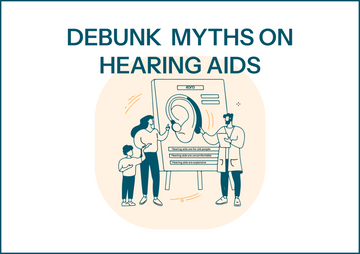Hearing loss is a growing concern for many individuals, from the young to the elderly. As technology advances, options to combat hearing loss have evolved as well. Two of the most common solutions are hearing aids and cochlear implants. While both aim to improve auditory experiences, their functions, effectiveness, and ideal candidates significantly differ. This blog post will delve into the distinctions between hearing aids and cochlear implants to help you make an informed decision about your hearing health.
What is Hearing Loss?
Before diving into the details of hearing aids and cochlear implants, it’s essential to understand what hearing loss is. It is characterized by the inability to hear sounds at normal levels, which can affect communication and quality of life. There are several types of hearing loss, including:
- Conductive Hearing Loss: Occurs when sound is not conducted efficiently through the outer ear canal to the eardrum and the tiny bones of the middle ear.
- Sensory Neural Hearing Loss: Results from damage to the inner ear or the auditory nerve pathways.
- Mixed Hearing Loss: A combination of conductive and sensory neural hearing loss.
- Tinnitus: Often associated with hearing loss, tinnitus involves hearing ringing or buzzing in the ears without any external sound.
Exploring Hearing Aids
Hearing aids are devices designed to amplify sound for individuals with hearing loss. They can be customized to suit your particular needs and preferences. Here’s a closer look at hearing aids:
Types of Hearing Aids
Hearing aids come in various styles and types, including:
- Behind-the-Ear (BTE): These sit behind your ear and are connected to a small tube that channels sound into the ear canal.
- In-the-Ear (ITE): ITE hearing aids fit completely inside the outer ear and are custom-molded to the wearer’s ear shape.
- In-the-Canal (ITC): Smaller than ITEs, ITCs are made to fit partially in the ear canal, making them less visible.
- Invisible-in-the-Canal (IIC): These are the smallest type of hearing aids, fitting deep within the ear canal and usually invisible from the outside.
Who Needs Hearing Aids?
If you experience mild to moderate hearing loss, you may benefit from using an OTC hearing aid. An audiologist can conduct tests to measure your unique hearing abilities and suggest the best options tailored to your needs. Being able to hear clearly and engage in conversations can immensely improve your quality of life.
A Deep Dive into Cochlear Implants
Cochlear implants are not a hearing aid in the traditional sense; they are sophisticated medical devices that provide a sense of sound to individuals who are profoundly deaf or severely hard of hearing. Unlike hearing aids, which amplify sound, cochlear implants bypass damaged portions of the ear and directly stimulate the auditory nerve.
Candidacy for Cochlear Implants
Cochlear implants are typically recommended for individuals who have:
- A severe to profound sensorineural hearing loss in both ears.
- Limited benefit from traditional hearing aids.
- Motivation and commitment to follow through with auditory rehabilitation.
Before proceeding with this option, a thorough evaluation by a qualified audiologist is crucial. They will assess the degree of your hearing loss, overall health, and lifestyle to determine if a cochlear implant is suitable for you.
How Cochlear Implants Work
The cochlear implant system consists of two main components:
- External Component: This includes a microphone that captures sounds and converts them into digital signals. These signals are then sent to a transmitter placed behind the ear.
- Internal Component: This surgical component is implanted under the skin behind the ear. It includes an electrode that stimulates the auditory nerve directly.
Once the device is activated, it requires time and practice to interpret the sounds, and auditory rehabilitation usually follows implantation.
Hearing Aids vs. Cochlear Implants: The Key Differences
When comparing hearing aids and cochlear implants, here are some essential differences to consider:
Method of Sound Processing
Hearing aids amplify sounds to help individuals hear better, while cochlear implants convert sounds into electrical signals that stimulate the auditory nerve directly. This fundamental difference shapes how each device interacts with the auditory system.
Type of Hearing Loss
Hearing aids are typically recommended for individuals with mild to moderate hearing loss. On the other hand, cochlear implants are better suited for those who experience severe to profound hearing loss and do not benefit significantly from hearing aids.
Surgical Requirements
Hearing aids are non-invasive and do not require any surgical procedures for fitting or use. Contrarily, cochlear implants involve surgery to implant the device, presenting potential risks and requiring recovery time.
Consulting an Audiologist
Deciding between hearing aids and cochlear implants is not a straightforward process. That’s where the expertise of an audiologist becomes invaluable. They can conduct necessary assessments, provide recommendations, and guide you through your options based on the severity of your hearing loss, lifestyle, and personal preferences.
Additionally, they can assist with programming and adjusting devices to meet your specific hearing needs, ensuring optimal performance regardless of the choice you make.
The Emotional Aspect of Hearing Loss
Dealing with hearing loss can be challenging on an emotional level. Many individuals may feel isolated or frustrated due to their condition. It’s essential to acknowledge these feelings and seek support either from professionals or local support groups. Talking about your experiences can help ease the transition and adapt to whichever solution you choose.
Empowered Choices for Better Hearing
With the crucial differences that exist between hearing aids and cochlear implants laid out, it’s clear that you have empowered choices ahead of you. Weighing the advantages of each option along with your unique situation can serve as the foundation for improving your hearing health. If you believe you may need assistance with hearing loss, reach out to an audiologist or make sure to explore available OTC hearing aid options that can enhance your quality of life.
Remember, the journey toward better hearing is not a solitary one. By engaging with professionals, staying informed, and having open conversations about your needs, you can take bold steps toward reclaiming your auditory experiences and enriching your life.
























